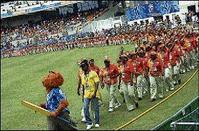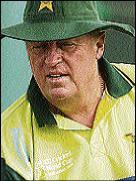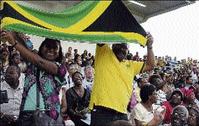Daraine Luton, Sunday Gleaner Reporter

ICC Cricket World Cup volunteers parade around Sabina Park before the start of the semi-final between New Zealand and Sri Lanka on Tuesday, April 24. - File
WHEN one of the men on stilts 'broke a leg' and fell during the opening ceremony of the ICC Cricket World Cup (CWC) at the Trelawny Multi-Purpose Stadium on March 11, many Jamaicans brushed it aside and hoped that it would be the only blemish on the tournament for which Jamaica had spent the last few years preparing.
The West Indies started with a bang, winning the first game against Pakistan on March 13 at Sabina Park, which lifted national and regional pride.
But Bob Woolmer died and the world's cameras focused on Jamaica for a negative reason.
The 58-year-old Pakistan coach was found dead in his Jamaica Pegasus hotel room on March 18, the day after Pakistan was beaten by minnows Ireland in a first-round fixture.
Pakistan was knocked out of the competition by the defeat, but even before the Irish could fully immerse themselves in their success, Woolmer died. Government pathologist Dr. Ere Sheshiah said it was was due to asphyxiation due to manual strangulation.
Thrown into a tailspin

Late Pakistan coach Bob Woolmer. - Reuters
Suddenly, CWC 2007 was thrown into a tailspin as Woolmer's shadow clouded the tournament. Jamaican police were now conducting a murder investigation and everyone who might have come in contact with Woolmer was being interrogated.
Malcolm Speed, the CEO of governing body, the International Cricket Council (ICC), said that the Caribbean's hosting of the tournament would remain overshadowed by the case.
"It is too early to predict how history will view the tournament, but certainly, Bob Woolmer's tragic death and the finish to the final, are two of the things that will be uppermost in the minds of people who followed the event," Speed reflected after the 47-day tournament ended with the final in Barbados on April 28.
Brian Murgatroyd, ICC media and communications manager, also admits that the Woolmer shadow will be one of the ways in which the tournament will be remembered.
"Bob's death was more than a tragedy. It is impossible to think of this tournament without thinking of Bob; but at the same time, there has been some excellent cricket and plenty to commend the Caribbean for," Murgatroyd told The Sunday Gleaner.
It cost Jamaica US$105 million (nearly $7 billion) to jointly host the cricket tournament with eight other Caribbean countries. Jamaica's role was to host the opening ceremony - for which a new stadium was built in Trelawny at a cost of US$30 million; warm-up matches - group matches involving the West Indies, Pakistan, Ireland and Zimbabwe; and, one semi-final match.
Visa system

Fans celebrating the success of the ICC Cricket World Cup opening ceremony at the Trelawny Multi-Purpose Stadium earlier this year. These two persons could hardly manage to hoist the 'heavy' Jamaican flag above their heads. -
Photo by Janet Silvera
As part of the security arrangements for CWC, Jamaica and the rest of the Caribbean instituted a common visa system as a precaution against terrorism.
Also, the Kingston Public Hospital and the University Hospital of the West Indies (UHWI) got equipment for which they had been clamouring for a long time. The state-owned Jamaica Urban Transit Company (JUTC) acquired new buses for its fleet, and the police also procured more equipment and vehicles, as Government went all out to paint a glowing picture of a developing Jamaica.
But Kingston, for the mayor, Desmond McKenzie, was an eyesore. He said that the city was filthy and chastised Government for not doing enough to make Jamaica glowingly beautiful.
Government had spoken about the redevelopment of the Kingston Waterfront, renovation of the Kingston Craft Market, and the general improvement of road networks in time for the World Cup; but most of this was talk.
The refurbished Sabina Park, as well as the newly built Trelawny stadium, however, were completed in time for the tournament.
Many Jamaicans had emptied their accounts or taken bank loans to capitalise on the thousands of visitors who were expected to grace the island's shores. But the visitors did not come in droves. Tourist arrivals for the months of March and April decreased over 2006 figures. Jamaica did not experience a full house for any of its games.
Positions battle
When the tournament ended, the Jamaica Labour Party (JLP), which had been opposing the then People's National Party (PNP) government's spending on the tournament resumed its battle, saying that the money could have been better spent on education.
Despite the end of Jamaica's leg of the CWC in April, it lingered on with Woolmer's body, which was impounded by Coroner Patrick Murphy. And even after the body was expatriated to South Africa, the Woolmer debacle remained on the Jamaican psyche for a while, at least until last month, when a coroner's inquest jury returned an open verdict.
It meant that there was not enough evidence to conclude murder or manslaughter or death by natural causes, a theory which overseas experts had posited, resulting in the local police calling off the murder inquiry.
Woolmer had died from natural causes the overseas experts said; but not even this was convincing to the jury.
With the inquest, the last of the ICC CWC slowly disappeared into the shadows in pretty much the same way 'Horse' and his broken stilt were pulled to the side of the stage during the cpening ceremony after he became lame.
Jamaica had indeed made 'history' with the hosting of the ICC CWC.

